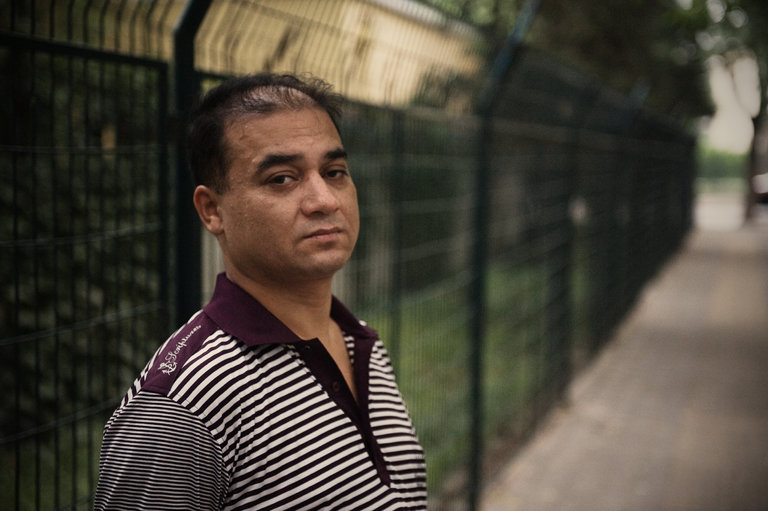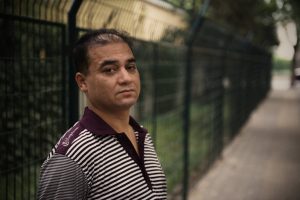Ilham Tohti, Uighur Scholar in Chinese Prison, Is Given Human Rights Award

The New York Times, 12 October 2016

By Nick Cumming-Bruce — Two years after the Chinese authorities sentenced the prominent Uighur intellectual Ilham Tohti to life imprisonment for promoting separatism and violence, a Swiss-based foundation awarded him a prestigious human rights prize on Tuesday for his efforts to foster dialogue and understanding.
Mr. Tohti, an economics professor at Minzu University in Beijing at the time of his arrest in January 2014, was named the winner of the Martin Ennals Foundation’s annual award, sometimes called the Nobel of human rights prizes, for two decades of work trying to defuse tensions between Uighurs and ethnic Han and promoting respect for Uighur culture. The Han are the dominant ethnic group in China.
“He has rejected separatism and violence, and sought reconciliation based on a respect for Uighur culture,” the foundation said in its announcement of the award, which flatly contradicts the Chinese government’s depiction of Mr. Tohti as a dangerous separatist propagating hatred and extremism.
Mr. Tohti was one of three finalists shortlisted for the prize, which recognizes human rights defenders who have worked at great personal risk and aims to generate international recognition that may afford them some protection.
The other finalists were Razan Zaitouneh, a Syrian human rights lawyer who was kidnapped with her husband and two colleagues in December 2013 in an area controlled by a jihadist opposition group and is still missing, and a group of rights advocates in Ethiopia, known as the Zone 9 bloggers, who defied strict controls on the news media to document human rights abuses and the plight of political prisoners.
Mr. Tohti started writing about the tensions and abuse in Xinjiang, a region in China’s far west, in the 1990s and was barred from teaching from 1999 to 2003, the foundation said. Prevented from publishing through normal channels, he set up a Chinese-language website, uighurbiz.net.
After riots erupted in Xinjiang in July 2009, Mr. Tohti published articles reporting arrests and disappearances ofUighurs by the Chinese authorities and was detained for several weeks.
“Xinjiang’s main conflict isn’t about terrorism or counterterrorism, it’s about inequality and the abuse of power,” Mr. Tohti said in an interview that the foundation included in a film portrait. “It’s about how powerful vested interests monopolize developmental resources.”
The police arrested Mr. Tohti at the Beijing airport in 2013 as he prepared to leave with his daughter, Jewher, to take up a post as a visiting scholar at Indiana University. He was rearrested in January 2014 and flown to Xinjiang, and after a two-day trial in the region’s capital, Urumqi, that September, he was sentenced to life imprisonment on charges of separatism.
“My father, Ilham Tohti, has used only one weapon in his struggle for the basic rights of the Uighurs of Xinjiang: words; spoken, written, distributed and posted,” Ms. Tohti said in a statement to the foundation. “This is all he has ever had at his disposal, and all that he has ever needed.”
The award, decided by a panel of 10 of the world’s leading human rights organizations, is certain to anger China. Officials there lobbied the Swiss federal authorities and the foundation in 2014 after it nominated another Chinese dissident, Cao Shunli, who died that year in prison. China’s Foreign Ministry reacted angrily in April 2014 when Mr. Tohti received an American human rights award for writers.
“When you attack the moderates, as the Chinese state is doing, and attack someone so harshly that someone like Ilham receives a life sentence for doing nothing that any liberal regime would consider a crime — in other words, he was simply expressing his opinion — what you do is that you leave the field open only to the extremists,” Elliot Sperling, an associate professor of Tibetan studies in the Central Eurasian studies department at Indiana University, said in the film profile of Mr. Tohti.
“What China is doing is feeding extremism,” he added. “This is very, very dangerous and something that the rest of the world really should pay attention to.”

